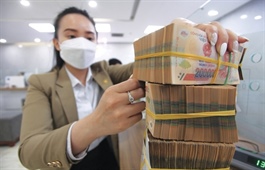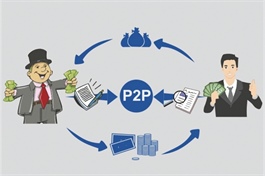Digital asset tax collection imminent
Digital asset tax collection imminent
Vietnam is moving closer to legalising digital asset transactions, marking a significant step that could unlock substantial tax revenues from a market worth hundreds of billions of US dollars annually.
In mid-April, Ben Zhou, co-founder and CEO of Bybit, the world’s second-largest cryptocurrency exchange, held discussions with Minister of Finance Nguyen Van Thang to explore investment opportunities and propose collaboration in the digital asset sector.
Bybit is already licensed to operate in several markets, including the United Arab Emirates, the Netherlands, Argentina, Kazakhstan, and Georgia, and is awaiting approval in Hong Kong and Malaysia.
According to Zhou, Vietnam is one of Southeast Asia’s most vibrant digital asset markets, with a tech-savvy investment community that quickly embraces blockchain technology.
“Vietnam needs to establish a legal framework soon to ensure the market operates transparently, safely, and sustainably,” he said. “Bybit is also very interested in the pilot exchange model and is ready to collaborate with Vietnam in building a legal framework for the digital asset market.”
Vietnam is indeed witnessing rapid growth in this field, with approximately 17.4 per cent of its population owning digital assets.
According to American blockchain analysis firm Chainalysis, Vietnam ranks fifth globally in cryptocurrency adoption, with about 27 million trading accounts expected by 2024, placing the country among the leaders in digital asset acceptance worldwide.
However, with the third-largest investor base globally and annual trading volume reaching $100 billion, the lack of a clear regulatory framework has made it difficult to manage the market. This also poses significant challenges for the government, ranging from tax collection and managing foreign currency outflows to protecting investors from fraud.
Dr. Truong Minh Huy Vu, director of the Ho Chi Minh City Institute for Development Studies, noted that most of the profit-generating activities of Vietnamese investors currently take place abroad, in locations like Singapore, the United States, and Hong Kong, exposing domestic investors to numerous risks.
He suggested that Vietnam should develop a clear legal framework, prioritise a sandbox mechanism to protect consumers, and implement appropriate tax policies to capitalise on the market’s potential revenue.
“Investors and businesses operating in the digital asset space don’t know how or to whom they should pay taxes. If regulations are implemented, this would be a significant revenue source and ensure the sustainable development of this market,” Vu said.
In February, the government assigned the Ministry of Finance (MoF) to draft resolutions for piloting a digital asset market. In late March, the MoF presented a draft resolution to the government, proposing the implementation of a pilot programme for issuing and trading digital assets. The draft also suggested coordination mechanisms between regulatory bodies, such as the MoF, the Ministry of Public Security, and the State Bank of Vietnam (SBV), to ensure financial safety and manage risks.
According to Bui Hoang Hai, vice chairman of the State Securities Commission, current legal systems do not classify digital assets clearly, making it difficult to apply tax policies.
“If specialised legislation on digital assets can clearly define their nature and allow these assets to be traded as property, tax obligations could be implemented under existing tax laws,” Hai said.
The Vietnam Blockchain Association estimates that a 0.1 per cent transaction tax rate could generate more than $800 million in tax revenue annually without disrupting the market. The association’s chairman Phan Duc Trung stated that regulatory frameworks would help the government collect taxes, manage the market, and protect investors, but policies should clearly prioritise specific objectives. If targeting domestic investors, the system needs to be competitive with other investment channels such as banking, real estate, and gold.
“These channels already have clear legal frameworks. A digital asset exchange will need to provide enough transparency, protect investors’ rights, and have a reasonable tax policy to ensure its attractiveness,” Trung said.
He added that overly complex or high tax rates would deter foreign investors. Conversely, reasonable tax policies and efficient capital flow management systems could make Vietnam an attractive digital financial hub in the region.
Dr Vu Van Tinh, a senior advisor at Salus Law Firm, proposed that Vietnam study Singapore’s PSA model, which clearly classifies types of digital assets and applies varying tax rates accordingly.
“Vietnam should also design optimal tax and fee mechanisms for pilot exchanges. During the initial stages, a sandbox approach could allow exchanges to operate for one to two years under the supervision of the SBV and the MoF,” said Tinh.
Regarding transaction fees, Tinh suggested rates ranging 0.1-0.2 per cent per transaction to engage investors, with exemptions or reductions for small transactions under $400 a day or withdrawal fees of 1-5 per cent on foreign investors’ profits, similar to stock market transactions.
“Favourable tax rates such as a 10 per cent corporate income tax over the first five years (similar to incentives for high-tech investors) and a zero VAT rate on digital asset transactions to promote liquidity, alongside a 5-10 per cent personal income tax on non-fungible token profits, should be applied. Additionally, authorities should mandate automatic financial reporting from exchanges to prevent tax evasion,” Tinh said.
- 16:09 06/05/2025

























